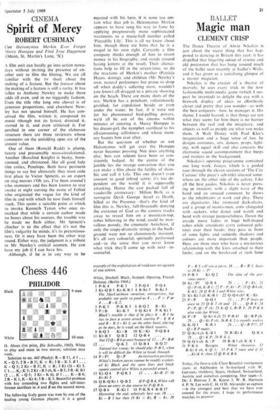CINEMA
Spirit of Mercy
ROBERT CUSHMAN
Can Heironymus Merkin Ever Forget Mercy Hunzppe and Find True Happiness (Odeon, St. Martin's Lane, 'X') A film unit can hardly go into action nowa- days without inviting the presence of an- other unit to film the filming. We are all familiar with the Tv short about the making of a feature. But the feature about the making of a feature is still a rarity. It has fallen to Anthony Newley to make these odds all even, and in no niggardly fashion. Even the title (the long one above) is of generous proportions, and elsewhere New- ley has not spared himself. He has con- ceived the film, written it, composed its music (though not its lyrics), directed it, starred in it, and even criticised it. For perched in one corner of the elaborate structure there are three reviewers whose comments on the unfolding opus are of the utmost value.
One of them (Ronald Radd) is plump, hearty and presumably mass-circulational. Another (Rosalind Knight) is beaky, horn- rimmed, and christened, like all good lady film critics, Penelope. Both have pertinent things to say but ultimately they must cede first place to Victor Spinetti, as an expert on stag movies ('Oh yes, I've been around') who stammers and has been known to stay awake at night cursing the name of Fellini who originated the vogue for the kind of film in and with which he now finds himself stuck. This seems a suitable point at which to invoke Kenneth Tynan who once re- marked that while a certain author made no bones about his sources, the trouble was he made no flesh either. Mr Spinetti's clincher is to the effect that it's not the film's vulgarity he minds, it's its pretentious- ness. Or it may have been the other way round. Either way, the judgment is a tribute to Mr Newley's critical acumen. He can have my job if I can have his.
Although, if he is in any way to be
equated with his hero, it is none too cer- tain what that job is. Heironymus Merkin
appears to have sung his way to fame by applying progressively more sophisticated treatments to a music-hall number called 'Piccadilly Lily'. This is all we know about him, though there are hints that he is a mogul in his own right. Certainly a film company thinks enough of him to invest money in his biography, and stands around having kittens at the result. Their alterca- tions help to fill in the screen-time; so do the reactions of Merkin's mother (Patricia Hayes, doting), and children (Mr Newley's own, natural performers but prone to drop off when daddy's suffering most, wouldn't you know) all dragged to a private showing on the beach. There are many shots of the sea; Merkin has a penchant, voluminously gratified, for copulation beside or even under the water. In fact, if it were not for his phenomenal bird-pulling powers, we'd all be out of the cinema within minutes of entering it. Mercy Humppe is his dream-girl, the nymphet sacrificed to his all-consuming selfishness and whose mem- ory haunts him ever after.
But the question of whether or not Heironymus will get over the Humppe never becomes pressing. Nor does anything else; bets can seldom have been so con- sistently hedged. At the centre of the jumble lies the strange conviction that you can make a film about the futility of show- biz and call it Life. This one doesn't even amount to good inbred satire; it's too de- pendent on the world it is supposedly attacking. Hence the cast packed full of vaudeville aristocracy: Milton Berle as a surrogate Devil, George Jesse! as Death, billed as the Presence—that's the kind of film this is. Newley, full-throatedly denying the existence of God as the camera tracks away to reveal him on a mountain-top, robes billowing in the wind, could be mar- vellous parody, the cinematic Antichrist, if only the soupy-dramatic strings in the back- ground were not so clamorously insistent. It's all very colourful, spiritedly performed and—in the sense that you never know what trick they'll come up with next—re- sourceful.


































 Previous page
Previous page